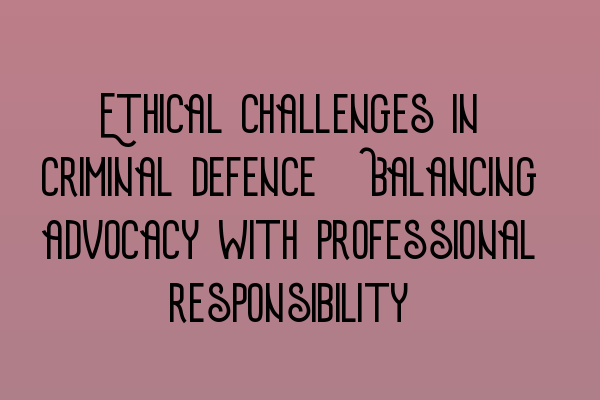Ethical challenges in criminal defence: Balancing advocacy with professional responsibility
At SQE Criminal Law & Practice Law UK, we believe that the role of a criminal defence solicitor is one that requires a delicate balance between advocacy and professional responsibility. In this blog post, we will explore the ethical challenges that criminal defence solicitors face in their day-to-day practice, and how they can effectively navigate these challenges to serve the best interests of their clients.
The Duty to Advocate
As criminal defence solicitors, our primary duty is to act in the best interests of our clients. This duty requires us to provide zealous advocacy to ensure their rights are protected and to secure the best possible outcome for them. We are their voice in the criminal justice system, fighting for justice and fair treatment.
However, this duty to advocate must be balanced with our professional responsibility to uphold the rule of law and promote ethical conduct within our profession. The Solicitors Regulation Authority (SRA) sets out clear guidelines and regulations that criminal defence solicitors must adhere to. These regulations aim to maintain the integrity of the legal profession and ensure that solicitors act in the best interests of justice.
Conflicts of Interest
One of the most common ethical challenges in criminal defence is managing conflicts of interest. Criminal defence solicitors often represent clients who may be associated with criminal activities or who have conflicting interests with other clients. Navigating these conflicts requires us to carefully assess the implications and potential risks involved.
It is crucial for criminal defence solicitors to maintain confidentiality and avoid any potential breaches of trust. We must be diligent in our duty to obtain all necessary information from our clients to provide effective representation, while also ensuring that we do not compromise the integrity of the legal process.
Client Autonomy
Another ethical challenge faced by criminal defence solicitors is balancing client autonomy with our professional judgment. While our clients have the right to make decisions about their case, we have a duty to provide them with accurate and honest advice based on our expertise and knowledge of the law.
It is essential for us to educate our clients about the potential consequences of their choices and guide them towards the most advantageous options. However, we must also respect their autonomy and support their decisions, even if we may personally disagree with them. This can be a delicate balancing act, but it is crucial to maintaining a strong client-solicitor relationship built on trust and mutual respect.
Ethical Considerations in Negotiations
Negotiations play a significant role in criminal defence, especially when it comes to plea agreements and settlements. As criminal defence solicitors, we have a duty to negotiate in good faith and to act honestly and transparently with all parties involved.
While our duty to advocate for our clients may sometimes lead us to employ strategic tactics, it is essential to maintain the highest ethical standards throughout the negotiation process. This includes disclosing all relevant information to the prosecution and ensuring that any agreements reached are fair and in the best interests of justice.
Conclusion
As criminal defence solicitors, we face numerous ethical challenges in our practice. Balancing advocacy with professional responsibility requires careful consideration of the ethical guidelines set by the SRA while zealously advocating for our clients’ best interests.
By managing conflicts of interest, respecting client autonomy, and maintaining ethical considerations in negotiations, we can navigate these challenges and fulfill our duty as criminal defence solicitors.
For more information about criminal law practice and the SQE exams, please check out our related articles:
- SQE 1 Practice Exam Questions
- SQE 1 Practice Mocks FLK1 FLK2
- SQE 2 Preparation Courses
- SQE 1 Preparation Courses
- SRA SQE Exam Dates
